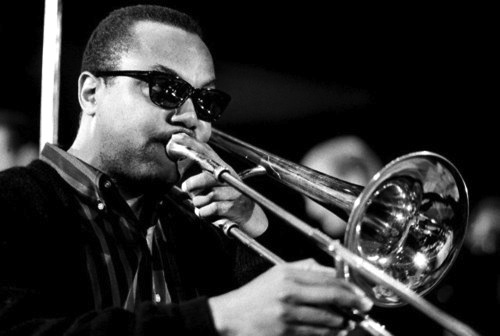J. J. Johnson – A Complete Biography
Introduction
J. J. Johnson was the pivotal modern trombonist who proved that the slide trombone could speak bebop’s fast, harmonically intricate language as fluently as saxophones and trumpets. His technical control, lyrical clarity, and composer’s ear made him a touchstone from the 1940s through the 1990s, influencing generations in small groups, big bands, and studios.

Childhood
James Louis Johnson was born on January 22, 1924, in Indianapolis, Indiana. He began piano lessons around age nine, switching to trombone in his early teens—an instrumental choice that would reshape modern jazz. His upbringing in the Midwest placed him near the vibrant touring-band circuit of the era, nurturing his earliest encounters with professional musicianship.
Youth
By his late teens Johnson was already working professionally. He joined Clarence Love’s band in 1941 and Snookum Russell’s in 1942, then vaulted to national exposure with Benny Carter’s orchestra from 1942 to 1945. With Carter he made early records and took solos that signaled his future promise. In 1944 he appeared in Norman Granz’s first Jazz at the Philharmonic concert; by 1945 he was touring with Count Basie, absorbing—and helping to redefine—the cutting edge of postwar jazz.
Adulthood
Bebop innovator and bandleader
Through the late 1940s and 1950s, Johnson adapted bebop’s vocabulary to the trombone with astonishing speed and articulation. Classic small-group dates and his own bands showcased his precision and melodic economy. He became a perennial poll-winner and earned wide acclaim for his artistry.
“Jay & Kai”
Producer Ozzie Cadena paired Johnson with fellow trombonist Kai Winding in the mid-1950s. The Jay & Kai recordings and tours became both musical landmarks and popular successes, demonstrating contrasting but complementary trombone voices in modern jazz.
Composer/arranger, Third Stream, and festival works
From the mid-1950s on, Johnson increasingly focused on writing: works like “Poem for Brass,” the orchestral suite Perceptions (with Dizzy Gillespie as soloist), and other concert pieces tied him to the Third Stream movement and to major festivals. His stature here—alongside his trombone playing—secured his reputation as both performer and composer.
Hollywood years and later career
In the late 1960s and 1970s Johnson moved to California, composing and arranging for film and television. Credits include the scores for Across 110th Street (1972) and Cleopatra Jones (1973), among others. He returned to frequent performing in the late 1980s and was active, on and off, into the mid-1990s.
Major Compositions
Johnson’s writing yielded a body of tunes that became jazz standards and calling cards for trombonists and non-trombonists alike:
- “Lament” – a definitive modern ballad.
- “Wee Dot” – a hard-swinging blues-bop line.
- “Kelo” and “Enigma” – recorded by Miles Davis and others.
These, together with suites and film themes, show a composer equally at home in tight small-group forms and larger, programmatic canvases.
Death
Johnson died at home in Indianapolis on February 4, 2001, at age 77. Reports at the time noted that his death was by suicide and also mentioned that he had been dealing with health struggles. The jazz world’s response underscored the magnitude of his influence and the affection held for his artistry and character.
Conclusion
J. J. Johnson’s legacy rests on three pillars. First, as a performer, he permanently expanded what the trombone could do in modern jazz—earning comparisons to Charlie Parker for his role in bebop. Second, as a composer/arranger, he left durable tunes and ambitious concert and film works that knit swing, bebop, and classical sensibilities. Third, as a model of craft, he showed how discipline and imagination could coexist, inspiring generations from Curtis Fuller to Steve Turre and beyond. Few musicians reshaped an instrument so completely; fewer still did it while writing music strong enough to outlive its moment.

Comments are closed